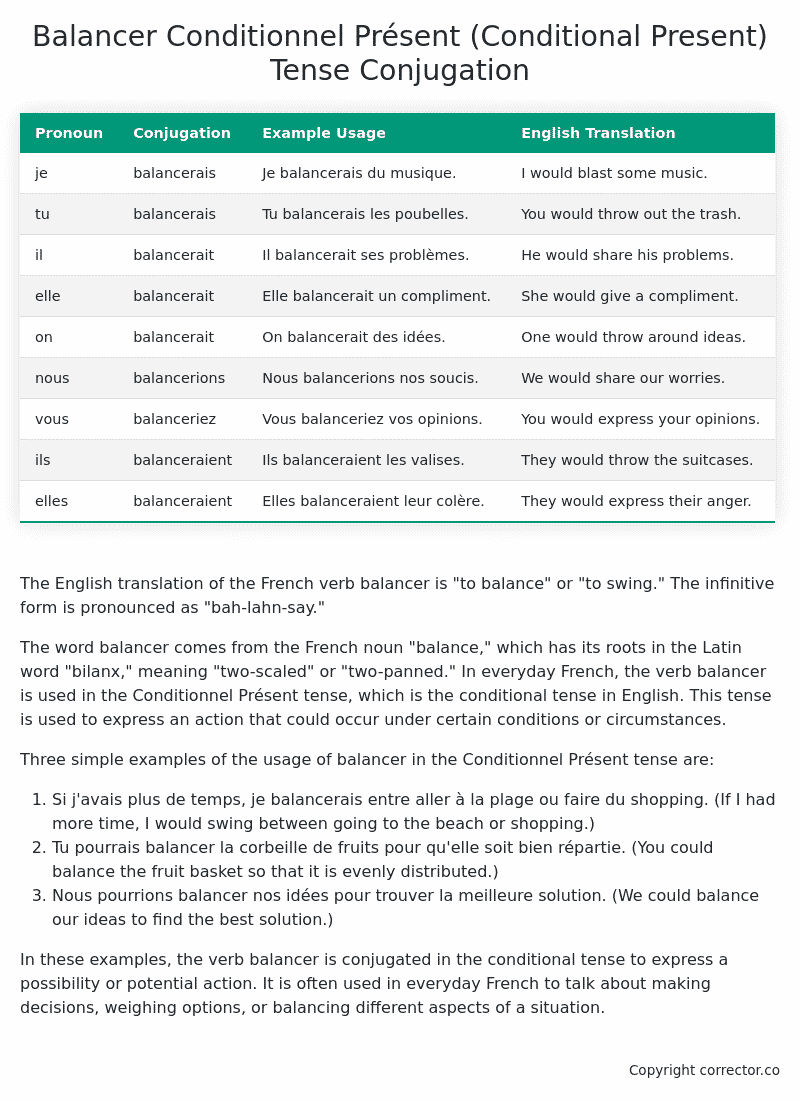Conditionnel Présent (Conditional Present) Tense Conjugation of the French Verb balancer
Introduction to the verb balancer
The English translation of the French verb balancer is “to balance” or “to swing.” The infinitive form is pronounced as “bah-lahn-say.”
The word balancer comes from the French noun “balance,” which has its roots in the Latin word “bilanx,” meaning “two-scaled” or “two-panned.” In everyday French, the verb balancer is used in the Conditionnel Présent tense, which is the conditional tense in English. This tense is used to express an action that could occur under certain conditions or circumstances.
Three simple examples of the usage of balancer in the Conditionnel Présent tense are:
- Si j’avais plus de temps, je balancerais entre aller à la plage ou faire du shopping. (If I had more time, I would swing between going to the beach or shopping.)
- Tu pourrais balancer la corbeille de fruits pour qu’elle soit bien répartie. (You could balance the fruit basket so that it is evenly distributed.)
- Nous pourrions balancer nos idées pour trouver la meilleure solution. (We could balance our ideas to find the best solution.)
In these examples, the verb balancer is conjugated in the conditional tense to express a possibility or potential action. It is often used in everyday French to talk about making decisions, weighing options, or balancing different aspects of a situation.
Table of the Conditionnel Présent (Conditional Present) Tense Conjugation of balancer
| Pronoun | Conjugation | Example Usage | English Translation |
|---|---|---|---|
| je | balancerais | Je balancerais du musique. | I would blast some music. |
| tu | balancerais | Tu balancerais les poubelles. | You would throw out the trash. |
| il | balancerait | Il balancerait ses problèmes. | He would share his problems. |
| elle | balancerait | Elle balancerait un compliment. | She would give a compliment. |
| on | balancerait | On balancerait des idées. | One would throw around ideas. |
| nous | balancerions | Nous balancerions nos soucis. | We would share our worries. |
| vous | balanceriez | Vous balanceriez vos opinions. | You would express your opinions. |
| ils | balanceraient | Ils balanceraient les valises. | They would throw the suitcases. |
| elles | balanceraient | Elles balanceraient leur colère. | They would express their anger. |
Other Conjugations for Balancer.
Le Present (Present Tense) Conjugation of the French Verb balancer
Imparfait (Imperfect) Tense Conjugation of the French Verb balancer
Passé Simple (Simple Past) Tense Conjugation of the French Verb balancer
Passé Composé (Present Perfect) Tense Conjugation of the French Verb balancer
Futur Simple (Simple Future) Tense Conjugation of the French Verb balancer
Futur Proche (Near Future) Tense Conjugation of the French Verb balancer
Plus-que-parfait (Pluperfect) Tense Conjugation of the French Verb balancer
Passé Antérieur (Past Anterior) Tense Conjugation of the French Verb balancer
Futur Antérieur (Future Anterior) Tense Conjugation of the French Verb balancer
Subjonctif Présent (Subjunctive Present) Tense Conjugation of the French Verb balancer
Subjonctif Passé (Subjunctive Past) Tense Conjugation of the French Verb balancer
Subjonctif Imparfait (Subjunctive Imperfect) Tense Conjugation of the French Verb balancer
Subjonctif Plus-que-parfait (Subjunctive Pluperfect) Tense Conjugation of the French Verb balancer
Conditionnel Présent (Conditional Present) Tense Conjugation of the French Verb balancer (this article)
Conditionnel Passé (Conditional Past) Tense Conjugation of the French Verb balancer
L’impératif Présent (Imperative Present) Tense Conjugation of the French Verb balancer
L’infinitif Présent (Infinitive Present) Tense Conjugation of the French Verb balancer
Struggling with French verbs or the language in general? Why not use our free French Grammar Checker – no registration required!
Get a FREE Download Study Sheet of this Conjugation 🔥
Simply right click the image below, click “save image” and get your free reference for the balancer Conditionnel Présent tense conjugation!

Balancer – About the French Conditionnel Présent (Conditional Present) Tense
Formation
Common Everyday Usage Patterns
Expressing Polite Requests
Expressing Hypothetical Situations
Expressing Doubt or Uncertainty
Interactions with Other Tenses
Present Tense
Past Tense
Future Tense
Conditional Perfect
Summary
Want More?
I hope you enjoyed this article on the verb balancer. Still in a learning mood? Check out another TOTALLY random French verb conjugation!


